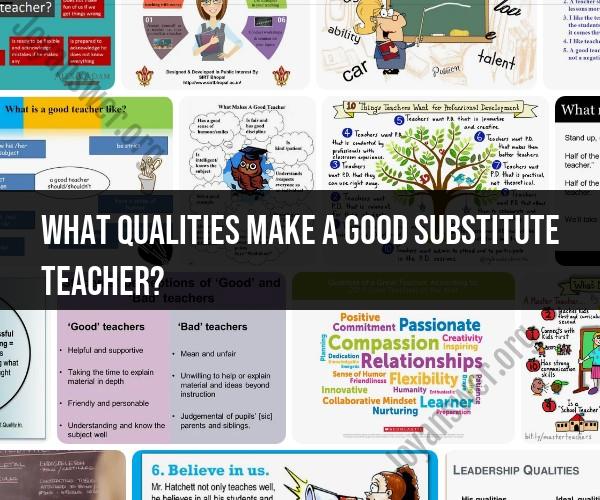What qualities make a good substitute teacher?
Effective substitute teachers possess a combination of personal qualities, interpersonal skills, and instructional capabilities that enable them to successfully navigate the challenges of temporary classroom assignments. Here are key attributes and qualities that make a good substitute teacher:
Adaptability: Substitute teachers must be adaptable to different grade levels, subjects, and classroom environments. The ability to quickly acclimate to new settings and situations is crucial for success in this role.
Flexibility: Being flexible in dealing with unexpected changes, adjustments to lesson plans, and unforeseen challenges is essential. Substitute teachers often face dynamic and unpredictable circumstances.
Classroom Management Skills: Effective classroom management is critical for maintaining order and creating a positive learning environment. Substitute teachers should be able to establish clear expectations, enforce rules, and address behavior issues appropriately.
Communication Skills: Clear and effective communication with students, school staff, and the regular teacher is essential. Good communication includes the ability to explain concepts clearly, provide instructions, and share information with colleagues.
Positive Attitude: Maintaining a positive and optimistic attitude contributes to a conducive learning atmosphere. A positive demeanor can help engage students, build rapport, and navigate challenges with resilience.
Preparedness: Well-prepared substitute teachers review lesson plans in advance, familiarize themselves with classroom procedures, and bring any necessary materials. Being prepared contributes to a smooth and successful day in the classroom.
Instructional Competence: While following the regular teacher's lesson plans, substitute teachers should have a basic understanding of instructional techniques and be capable of delivering content effectively. This includes facilitating class discussions, answering questions, and adapting teaching methods as needed.
Problem-Solving Skills: The ability to think on your feet and solve problems is crucial for substitute teachers. They may encounter unexpected situations or disruptions and need to address them promptly and effectively.
Interpersonal Skills: Building positive relationships with students, colleagues, and school staff is important. Substitute teachers should be approachable, respectful, and able to connect with students even during brief assignments.
Professionalism: Demonstrating professionalism through punctuality, appropriate dress, and adherence to school policies and procedures is key. Substitute teachers serve as representatives of the school and should conduct themselves in a manner that reflects positively on the educational institution.
Cultural Sensitivity: Recognizing and respecting diversity is important in today's classrooms. Being culturally sensitive helps substitute teachers connect with students from different backgrounds and create an inclusive learning environment.
Calm Under Pressure: Substitute teachers may encounter unexpected challenges or disruptions. The ability to remain calm under pressure, handle unexpected situations with composure, and follow emergency procedures is crucial.
Reliability: Being reliable and consistent in fulfilling assignments, following through on commitments, and communicating effectively with the school staff contributes to a positive reputation as a substitute teacher.
These qualities collectively contribute to the effectiveness of substitute teachers and enhance their ability to provide a positive and enriching educational experience for students, even in the absence of the regular teacher.
Unveiling the Magic Formula: Qualities of an Effective Substitute Teacher
Stepping into a new classroom every day requires a unique blend of skills and personality traits. So, what makes an effective substitute teacher? Let's dive into the magic formula:
1. Characterizing Qualities:
- Adaptability and Flexibility: Embrace the unexpected, adjust to different age groups, subjects, and classroom dynamics with ease. (Think chameleon navigating diverse ecosystems!)
- Positive Attitude and Encouragement: Radiate enthusiasm for learning, uplift students, and inspire a positive classroom atmosphere. (Imagine sunshine brightening even the gloomiest days!)
- Strong Communication Skills: Articulate expectations clearly, engage in active listening, and build rapport with students and colleagues. (Picture a skilled diplomat bridging different worlds!)
- Effective Classroom Management: Maintain order, address disruptions calmly, and establish a sense of respect and trust. (Think conductor harmonizing the orchestra!)
- Resourcefulness and Creativity: Turn impromptu situations into learning opportunities, utilize available resources, and keep students engaged. (Imagine MacGyver crafting solutions with whatever's around!)
2. Traits Contributing to Success:
- Empathy and Compassion: Understand students' needs and perspectives, offer support and encouragement, and create a safe learning environment. (Picture a nurturing caregiver providing comfort and guidance.)
- Strong Work Ethic and Professionalism: Arrive prepared, deliver quality instruction, follow school policies, and maintain professional conduct. (Think the epitome of dedication and responsibility!)
- Cultural Competence: Respect diverse backgrounds and learning styles, adjust communication and teaching approaches accordingly. (Imagine a global citizen embracing different cultures and perspectives.)
- Sense of Humor and Playfulness: Use humor appropriately to lighten the mood, connect with students, and make learning enjoyable. (Think Mary Poppins sprinkling a touch of magic into the classroom!)
- Lifelong Learner: Embrace continuous learning, explore new teaching methods, and stay updated on curriculum changes. (Imagine a curious explorer forever seeking new knowledge and experiences!)
3. Essential Skills for Managing Diverse Classrooms:
- Differentiated Instruction: Cater to various learning styles and abilities, adjust teaching methods and materials to maximize engagement. (Think artist painting a unique masterpiece for each student!)
- Conflict Resolution Skills: Address disruptions calmly, find constructive solutions, and promote cooperative learning. (Imagine a skilled mediator negotiating peace and understanding!)
- Time Management: Plan effectively, delegate tasks when possible, and ensure all key learning objectives are covered within the allotted time. (Think a master conductor keeping the orchestra on track!)
- Assessment and Feedback: Continuously monitor student progress, provide constructive feedback, and adjust instruction based on learning needs. (Think a wise coach offering guidance and helping students reach their full potential!)
- Technology Integration: Utilize technology effectively to enhance lessons, engage students, and cater to diverse learning styles. (Think a tech-savvy wizard wielding digital tools for educational magic!)
4. Building Rapport and Engaging Students:
- Icebreakers and Get-to-Know-You Activities: Facilitate interactions, learn student names, and create a welcoming atmosphere from the start. (Think a friendly host opening the door to a world of learning!)
- Interactive Teaching Methods: Encourage active participation, utilize group work, discussions, and hands-on activities to keep students engaged. (Imagine a captivating storyteller drawing everyone into the narrative!)
- Positive Reinforcement and Encouragement: Celebrate successes, acknowledge effort, and provide constructive feedback to motivate students. (Think a cheerleader pumping up the team and celebrating every victory!)
- Respectful Interactions and Active Listening: Show genuine interest in students' thoughts and feelings, create a safe space for open communication, and listen attentively to their questions and concerns. (Think a patient mentor lending a listening ear and offering sage advice!)
- Sense of Humor and Playfulness: Use humor appropriately to build rapport, make learning enjoyable, and create a relaxed and positive classroom atmosphere. (Think a playful friend sharing laughter and making learning fun!)
5. Inspiring Examples:
- Mr. Rogers: Remember his gentle kindness, genuine empathy, and ability to connect with children of all ages? Those qualities made him a role model for substitute teachers and educators alike. (Image of Mr. Rogers)
- Jaime Escalante: This math teacher's dedication to his students, particularly those from underprivileged backgrounds, and his innovative teaching methods transformed countless lives. His story exemplifies the power of passion and commitment in the classroom. (Image of Jaime Escalante)
- Erin Gruwell: This English teacher used writing and personal narratives to help her students overcome prejudice and connect with each other. Her story, captured in the movie "Freedom Writers," demonstrates the impact of empathy and understanding in creating a positive learning environment. (Image of Erin Gruwell)
Remember, effective substitute teachers come in all shapes and sizes, each with their unique blend of qualities and skills. The key is to













